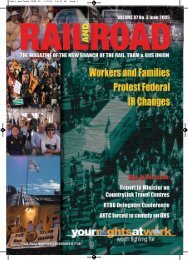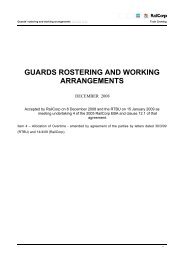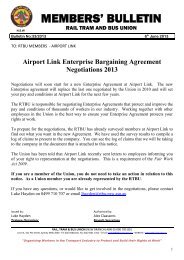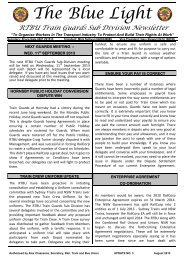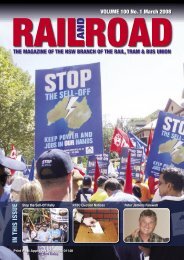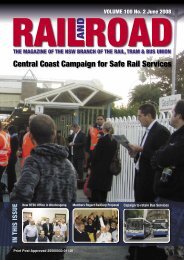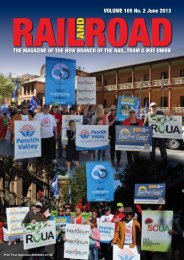Safety Matters - Rail, Tram and Bus Union of NSW
Safety Matters - Rail, Tram and Bus Union of NSW
Safety Matters - Rail, Tram and Bus Union of NSW
You also want an ePaper? Increase the reach of your titles
YUMPU automatically turns print PDFs into web optimized ePapers that Google loves.
Total incapacity<br />
First 26 weeks <strong>of</strong> total incapacity<br />
During the first 26 weeks <strong>of</strong> total incapacity (in general medically certified<br />
as being unable to perform any duties at all) a worker is entitled to receive<br />
their “current weekly wage rate” (cwwr).<br />
A worker under an industrial award or registered industrial agreement/<br />
consent award is paid the base amount shown in such an award not including<br />
any amounts for overtime, allowances or penalties.<br />
There is a cap on the cwwr <strong>of</strong> $1,535.90 as at 1 April 2007.<br />
SECTION THREE<br />
<strong>Safety</strong> <strong>Matters</strong> A Guide for Workplace OHS Representatives<br />
• Sec. 42(3) <strong>of</strong> the Workers Compensation Act 1987 (WCA) states that where a<br />
worker is not covered by an award but “there is such an award under which<br />
the worker would be entitled to be remunerated if the worker performed<br />
that work under a contract <strong>of</strong> service”, the worker shall be deemed to come<br />
under that award.<br />
• A worker who is not covered by an award or who is not captured by Sec.<br />
42(3) above is paid 80% <strong>of</strong> their “average weekly earnings” (awe). This<br />
figure becomes the worker’s cwwr. AWE are calculated by averaging out the<br />
worker’s earnings for the previous 12 months, or, if this is not appropriate,<br />
using other mechanisms such as “comparable worker” earnings.<br />
The same principles generally apply to casuals although the legislation does<br />
not make this clear. However if a casual works under an award which does not<br />
show a rate other than a weekly one, the cwwr is 80% <strong>of</strong> awe.<br />
• If a worker has 2 or more jobs a formula is applied to reduce the number <strong>of</strong><br />
hours for which compensation is payable to 40.<br />
Note: a worker with 2 or more jobs cannot be penalised by this 40 hour<br />
provision if the cwwr resulting is less than than that which would’ve applied<br />
if the worker’s cwwr had been solely based on wages earned at the employer<br />
with whom the injury occurred.<br />
Workers are entitled to receive 26 weeks at the cwwr for total incapacity even<br />
if this is made up <strong>of</strong> separate periods ranging over a period longer than 26<br />
calendar weeks from the date <strong>of</strong> injury <strong>and</strong> even if periods <strong>of</strong> partial incapacity<br />
intervene.<br />
BACK TO CONTENTS<br />
A Summary <strong>of</strong> Workers Compensation in <strong>NSW</strong><br />
18<br />
RAIL<br />
TRAM AND BUS<br />
U N<br />
I O N





